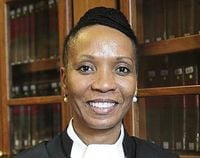On April 24, 2025, President Cyril Ramaphosa took a significant step in shaping South Africa's judiciary by nominating four candidates for the vacant position of Deputy Chief Justice. This role has been unfilled since Justice Mandisa Maya was elevated to Chief Justice, leaving a crucial gap in the country's legal framework.
The candidates nominated by President Ramaphosa include Gauteng Judge President Dunstan Mlambo, Supreme Court of Appeal President Mahube Molemela, Free State Judge President Cagney Musi, and Northern Cape Judge President Pule Tlaletsi. Each of these individuals brings a wealth of experience and legal acumen to the table, but the nominations have already sparked discussions regarding their backgrounds and the implications of their selections.
Dunstan Mlambo, who serves as the Judge President of Gauteng, is known for his robust legal opinions and leadership within the judiciary. Mahube Molemela, the President of the Supreme Court of Appeal, has made significant contributions to the legal landscape in South Africa, particularly in the realm of civil rights and justice. Cagney Musi and Pule Tlaletsi, both leading judges in their respective provinces, are also recognized for their commitment to upholding the law and ensuring justice is served fairly.
Letters have been dispatched to leaders of political parties in parliament and the Judicial Service Commission (JSC), seeking their views on these nominations. This consultation process is mandated by Section 174(3) of the South African Constitution, which requires input on the suitability of candidates for this pivotal judicial role. The move reflects the government's commitment to transparency and inclusivity in the appointment process, allowing various political perspectives to be considered.
The Deputy Chief Justice position is crucial, as it supports the Chief Justice in overseeing the judiciary and ensuring the effective functioning of the court system. The appointment carries significant weight, impacting not only the judiciary but also the broader legal landscape in South Africa. Given the historical context of judicial appointments in the country, the nomination of candidates from various backgrounds is an essential aspect of fostering a diverse and representative judiciary.
As the nomination process unfolds, it remains to be seen how the political parties and the JSC will respond to these candidates. The legal community and the public are keenly observing how this selection will influence the judiciary's future. Will the candidates be viewed as suitable stewards of justice? Or will their nominations raise eyebrows due to a perceived lack of diversity in terms of their professional backgrounds?
In recent years, South Africa's judiciary has faced scrutiny over its composition and the need for reforms that reflect the country's demographic diversity. Critics argue that while the judiciary has made strides toward inclusivity, there is still a long way to go to ensure that all voices are represented in the highest echelons of the legal system.
As discussions around the nominations progress, it is essential to consider the broader implications of these appointments. The Deputy Chief Justice plays a vital role in shaping judicial policy and overseeing the administration of justice in South Africa. The candidates' backgrounds, experiences, and judicial philosophies will undoubtedly influence their approach to this responsibility.
Furthermore, the consultation process allows for a critical examination of the candidates' qualifications and their potential to contribute positively to the judiciary. Political leaders and members of the JSC will have the opportunity to weigh in on the candidates' merits, ensuring that the final decision reflects a consensus that prioritizes the rule of law and justice.
As the nation awaits feedback from political leaders and the JSC, the spotlight remains firmly on the four candidates. Their appointments could signal a new chapter for the South African judiciary, one that emphasizes accountability, transparency, and a commitment to justice for all citizens.
In conclusion, the nomination of Dunstan Mlambo, Mahube Molemela, Cagney Musi, and Pule Tlaletsi for the position of Deputy Chief Justice marks a pivotal moment in South Africa's legal landscape. The outcome of this process will not only affect the candidates but also set a precedent for future judicial appointments, highlighting the importance of diversity and representation in the judiciary.





